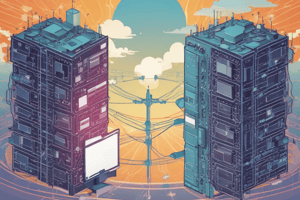Podcast
Questions and Answers
What is horizontal scaling, also known as 'scaling out', and how does it differ from vertical scaling?
What is horizontal scaling, also known as 'scaling out', and how does it differ from vertical scaling?
Horizontal scaling is distributing an application or service across multiple machines to distribute workload, unlike vertical scaling which involves upgrading a single machine.
What is the role of a load balancer in a horizontally scaled system?
What is the role of a load balancer in a horizontally scaled system?
A load balancer distributes incoming requests across multiple machines, preventing any single machine from becoming overloaded.
What are some advantages of horizontal scaling?
What are some advantages of horizontal scaling?
Advantages include high availability, elasticity, and cost-effectiveness.
What are some challenges associated with horizontal scaling?
What are some challenges associated with horizontal scaling?
How does horizontal scaling enable adapting to changing workloads?
How does horizontal scaling enable adapting to changing workloads?
Flashcards are hidden until you start studying





